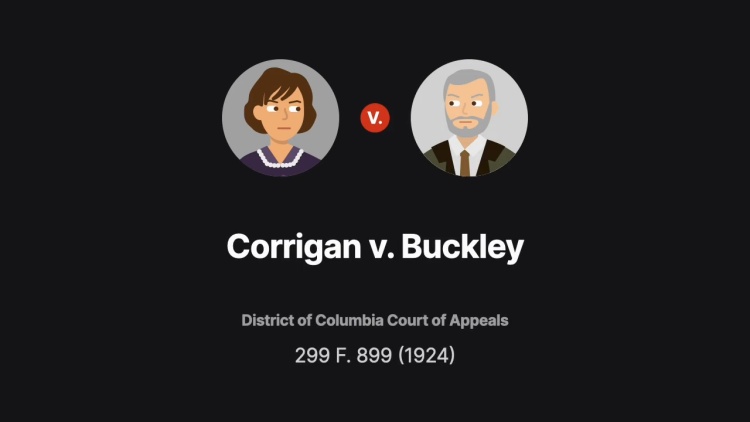Corrigan v. Buckley
District of Columbia Court of Appeals
299 F. 899 (1924)
- Written by Elliot Stern, JD
Facts
In 1921, John Buckley (plaintiff) and Irene Corrigan (defendant) were among 30 owners of land in a neighborhood in the District of Columbia who executed a covenant governing a specified area of land owned by the owners. The covenant provided that no part of the land covered by the covenant could be used, occupied, sold, leased, or given to Black people. The covenant was binding on the owners, as well as their heirs and assigns, for a period of 21 years. Corrigan entered into a contract with Helen Curtis (defendant), a Black woman, to sell to Curtis her house and her lot located on the land covered by the racially restrictive covenant. Buckley sued, asking the court to prevent the sale from being consummated and to enjoin Corrigan from carrying out the contract until the 21-year period set by the covenant had expired. Curtis brough a motion to dismiss, arguing that the covenant was void because it deprived her and other Black people of their constitutional rights. The court rejected the motion to dismiss and enjoined Corrigan from selling the property to Curtis. Corrigan and Curtis appealed.
Rule of Law
Issue
Holding and Reasoning (Van Orsdel, J.)
What to do next…
Here's why 907,000 law students have relied on our case briefs:
- Written by law professors and practitioners, not other law students. 47,100 briefs, keyed to 996 casebooks. Top-notch customer support.
- The right amount of information, includes the facts, issues, rule of law, holding and reasoning, and any concurrences and dissents.
- Access in your classes, works on your mobile and tablet. Massive library of related video lessons and high quality multiple-choice questions.
- Easy to use, uniform format for every case brief. Written in plain English, not in legalese. Our briefs summarize and simplify; they don’t just repeat the court’s language.





